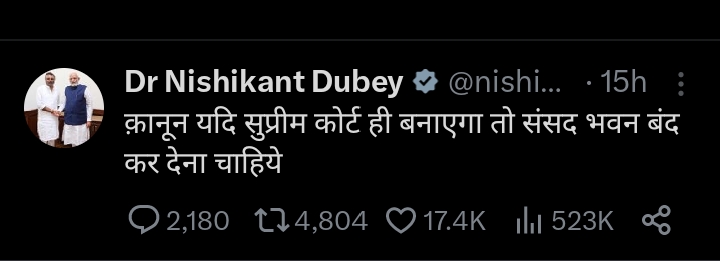By The Sampadak Express
Amid an ongoing tussle between the legislature and the judiciary, BJP MP Nishikant Dubey launched a scathing attack on the Supreme Court on Saturday, questioning its authority in lawmaking and accusing it of overstepping constitutional boundaries.
Taking to X (formerly Twitter), the four-time MP from Godda, Jharkhand, wrote in Hindi: “If the Supreme Court is going to make the laws, then Parliament should be shut down.” His remarks echo Vice President Jagdeep Dhankhar’s recent criticism of the judiciary, reigniting a debate on the separation of powers.

Dubey’s comments came in the wake of the Supreme Court raising concerns over certain provisions of the Waqf (Amendment) Act, recently passed by Parliament. The Centre has assured the Court it would hold off on implementing the contentious provisions until further hearings. The Act now faces multiple legal challenges.
Slamming the court’s handling of the matter, Dubey accused the judiciary of selective scrutiny. He pointed out that while the Court had demanded documentary evidence in religious matters like the Ram Mandir case, similar demands were not made in the Waqf case.
Citing Article 368 of the Constitution, Dubey said the responsibility of framing laws rests with Parliament, while the judiciary is tasked with interpreting them. “The court can issue directions to the government, but not to Parliament,” he asserted.
The BJP MP also criticised earlier landmark rulings of the Supreme Court, including the 2015 verdict striking down Section 66(A) of the IT Act and the 2018 decision decriminalising consensual homosexuality. He termed these judgments examples of “judicial overreach” and claimed they did not reflect societal consensus. He argued that Section 66(A) was essential to prevent the spread of offensive online content.
In a strongly worded statement, Dubey questioned the Supreme Court’s authority to set deadlines for constitutional functionaries like the President. “How can the court issue instructions to the appointing authority, when it is the President who appoints the Chief Justice of India?” he asked. He further warned that the court’s actions could lead the country toward “anarchy.”
“The Supreme Court is responsible for inciting religious wars in the country. It is going beyond its limits. If we have to approach the Supreme Court for everything, then what is the role of Parliament and the State Assemblies?” he said.
The controversy stems from a recent directive by the Supreme Court asking the President of India to respond within a fixed timeframe to Bills sent for approval—a move that has sparked widespread debate. Vice President Dhankhar had also criticized the judiciary for previously invalidating the National Judicial Appointments Commission (NJAC) Act in 2015.
Reacting sharply to Dubey’s remarks, the Congress accused the BJP of undermining judicial independence. Congress MP Jairam Ramesh said during a press conference, “Constitutional functionaries, ministers, BJP MPs are speaking against the Supreme Court just because it is upholding the basic structure of the Constitution. If a law violates the Constitution, the Court has the right to strike it down.”
He further alleged that the BJP’s attacks on the judiciary were deliberate, especially in light of recent rulings such as the Supreme Court’s verdict on electoral bonds, which deemed the government’s actions unconstitutional.
As the clash between the judiciary and legislature intensifies, political observers warn that the friction could have long-term implications for India’s democratic framework and the principle of checks and balances enshrined in the Constitution.



